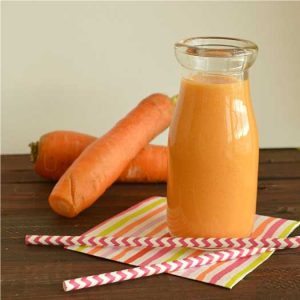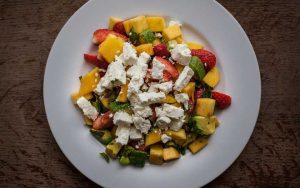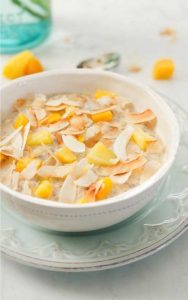Fertility health is not something women tend to worry about until calamity strikes and they find themselves not being able to conceive. Infertility may sound like a complicated issue, but in many cases, a woman finds it difficult to conceive because she is generally not healthy and has not been eating the right foods. Read on…
Not taking in important nutrients is not a small matter, especially when it comes to one’s fertility health. Most people do not realise that fertility health is tied closely to one’s internal well being, where good nutrition plays an integral part in ensuring that the body gets what it needs to be healthy and fertile. It makes perfect sense that a body that is lacking in certain nutrients will not be able to conceive or worse, might not be able to carry a baby properly to full term, leading to miscarriages and/or a baby born with health issues.
So, unless there are underlying medical conditions present that are hindering a woman from getting pregnant, her overall health does count and a faulty diet could be the main cause of her poor health.
Reevaluate your diet
If you’re trying for a baby, the kind of food you consume matter greatly for there is a direct link between a person’s health and her diet, where either the positive or negative effects are slow and coming. So, it is only right to conclude that if your body doesn’t get the required nutrients it needs to thrive, especially for long periods, problems are bound to creep in, causing a host of health issues including infertility.
The human body needs essential nutrients for its many functions, and reproduction is one of those functions. Any way you look at it, the body can only take so much when it comes to negligence and improper diet. Sooner or later, you’ll be seeing and/or feeling the results of this health abuse.
What’s worse is, even if one does manage to get pregnant despite being generally unhealthy, the possibilities of problems arising during the pregnancy are higher.
Nutrients are essential for your fertility health
Through the ages and also among almost every culture around the world, women of childbearing ages have always been encouraged to either consume fertility-enhancing foods or stay away from foods that can harm one’s fertility health or both. While some young women may still be fortunate enough to acquire enough nuggets of wisdom handed down from their elders, many have no such luck and have little or no idea which nutrients are needed to support their fertility health. This article aims to change that and hopefully help enhance the health status of women who are thinking of having a baby.
First and foremost, let’s get to know the important players in terms of nutrients that will help support your overall system and lead to better fertility health so that you can start to include them in your day to day meals (if you cook at home) or make more mindful choices when you eat out.
Iron
Iron is a nutrient of real concern among women in their childbearing years. Low iron levels may contribute to disruptions in the ovulation cycles, and this may hinder conception or even render a pregnancy fragile.
Meat, beans, fish, leafy green vegetables, seeds, and fortified cereals are rich in iron. Fish, seeds, and leafy greens also have anti-inflammatory properties, which can help mitigate cramps and encourage healthy blood flow. Another tip: Eat plenty of food high in Vitamin C such as bell peppers, tomatoes, broccoli, kiwi, and citrus for these help the body absorb iron from beans, whole grains, fortified cereals, and other iron-rich foods.
Vitamin E
Vitamin E also called ‘Tocopherol’, carries the meaning of to bear young. Experts believe that vitamin E is important because it is found in the fluid around developing eggs and when taken by men, it is said to help boost sperm health. It’s also known as a powerful antioxidant that aids in mopping up harmful free-radicals in the human body. You can turn to foods like avocados, sweet potatoes, nuts, almonds, sunflower seeds, papaya, olives, and spinach for good quality Vitamin E.
Seeds and nuts
Seeds and nuts, especially in their raw form, contain vitamin E, which is an antioxidant that helps to protect the DNA in both sperm and eggs.
Carbohydrates: The good vs the bad
Here’s a nutrient that has received a lot of attention due to diet fads around the world. There are no-carb diets, low-carb diets, carb-rich diets, etc. Scientifically, the human body needs carbohydrates for energy, but the thing to keep in mind here is that there are good carbs and bad ones. Good carbohydrates are digested slowly by the human body and have a more gradual effect on blood sugar and insulin. Whole-grain products such as brown rice, whole-grain pasta, beans, whole wheat bread, whole oats, buckwheat, millet, whole rye, whole-grain barley and whole-grain corn are considered good carbohydrates. These foods are coincidentally also rich in nutrients your body needs to support great overall health — fiber, vitamins, minerals, and phytonutrients.On the other end of the scale, bad carbohydrates (like cookies, cakes, white bread and white rice) are digested very quickly, and they convert rapidly into blood sugar. To drive down the blood-sugar spike, the pancreas releases insulin into the bloodstream. Studies have found that high insulin levels appear to inhibit ovulation, thus hindering conception.
The take home message here when it comes to carbohydrates is to make wiser food choices and if possible, avoid the bad carbs and stick to the good ones.
Beta-carotene
Beta carotene is a precursor of Vitamin A. It is essential to the human body as it aids in the regulation of hormones, possibly preventing early miscarriages during pregnancy. A woman’s corpus luteum, which helps produce the progesterone necessary to sustain a pregnancy, utilises a substantial amount of this nutrient to function well.
Foods such as carrots, cantaloupe, butternut squash, sweet potato, spinach, broccoli, and kale are rich in beta carotene. To ensure that you get enough from the food you eat, choose the freshest produce you can afford and consume them raw whenever possible.

Try this:
Carrot, Cucumber & Cantaloupe Smoothie
Ingredients:
- 1 cup fresh chopped carrots
- ½ cups fresh chopped cucumber
- 1 cup chopped cantaloupe flesh
- 1 medium banana, peeled
- 8 ounces unsweetened almond milk or any other milk of your choice
Method:
- Place all ingredients in a good blender or smoothie maker and blend to a smoothie texture. On hot, balmy days, you can add some ice cubes for a refreshing, nourishing thirst quencher.
Turn to plants for your protein
The risk of ovulatory disorders is cut in half when five percent of your total calorie intake is derived from plant proteins! So, women who eat a lot of plant protein such as those found in beans and pulses are less likely to have trouble trying to conceive. Not only is plant protein important to fertility health, but a public health study from Harvard found that infertility was almost 40 percent more likely in women with the highest intake of animal protein!
Tofu, edamame, and nuts are also good plant-based proteins. Toss some into a salad, or have some yummy stir-fried beans for dinner!

Tofu and french beans stir-fry
Ingredients
- ½ cup vegetable broth or reduced-sodium chicken broth
- 3 tbsp reduced-sodium soy sauce
- 3 tbsp cornstarch, divided
- 2 tbsp plus 1 tsp sugar
- ¼ tsp pounded red chillies, or more to taste
- 14-ounce extra-firm water-packed tofu, drained
- ¼ tsp salt
- 2 tbsp canola oil, divided
- 1 tbsp minced garlic
- 1 tbsp minced fresh ginger
- 6 cups stringed and cut french beans
- 3 tbsp water
Method:
- Combine broth, soy sauce, 1 tablespoon cornstarch, sugar, and crushed red pepper in a small bowl. Set aside.
- Cut tofu into ¾-inch cubes and pat dry, then sprinkle with salt.
- Place the remaining cornstarch in a large bowl, add the tofu; toss gently to coat.
- Heat a tablespoon of cooking oil in a large nonstick skillet or wok over medium-high heat. Add the tofu; cook, undisturbed, until browned, about three minutes. Gently turn and cook, stirring occasionally, until browned all over, for two to three minutes more and transfer to a plate.
- Reduce heat to medium and add the remaining cooking oil, garlic, and ginger; cook until fragrant, for about 30 seconds.
- Add the french beans and water; cover and cook for about two minutes, stirring once or twice.
- Stir the reserved broth mixture and add to the pan. Cook until the sauce has thickened which will take a minute or two.
- Return the tofu to the pan; toss to combine with the beans and sauce.
Vitamin C
Vitamin C improves hormone levels and increases fertility in women suffering from luteal phase defects — disruption in a woman’s menstrual cycle where the uterus does not grow properly. This can make it difficult to maintain a pregnancy to full term.
As for men, vitamin C has shown to improve sperm quality and protects it from DNA damage, in turn helping to reduce the chances of miscarriages due to chromosomal issues. It also helps to improve sperm motility by preventing them from clumping together.
Vitamin C is abundant in tomatoes, citrus fruits, mangoes, and berries. Vegetables such as capsicum, broccoli, potatoes, and cabbage are also rich in this vitamin.

Try this:
Fruit salad with feta cheese
Ingredients:
- 2 medium mango, cut into cubes
- A handful of blueberries
- 1 medium orange, segmented
- ½ small red onion, thinly sliced
- 1/3 cup crumbled feta or goat cheese
- 3 basil leaves, julienned
Dressing:
- 1 tbsp extra virgin olive oil
- 1 tsp maple syrup
- Juice & zest of an orange
Method:
- In a small bowl, whisk together all of the dressing ingredients.
- In a medium bowl, combine all of the salad ingredients.
- Drizzle the dressing over the salad and serve.
B Vitamins
The entire group of B vitamins is said to aid your ovaries in releasing an egg during ovulation. B6 especially increases levels of progesterone which is necessary to maintain your pregnancy once you conceive. Along with this, B6 also regulates blood sugars, alleviates premenstrual syndrome, and may also relieve symptoms of morning sickness. You’ll find Vitamin B6: Chickpeas, brown rice, leafy greens, turkey, liver, salmon, cod asparagus, and garlic.
Vitamin B12 is said to boost sperm quality and production. It may also increase the endometrial lining in egg fertilisation, decreasing miscarriages. Clams, oysters, mussels, liver, caviar, crab, lobster, cheese, and eggs are all rich sources of Vitamin B12.
Folic acid
It is probably one of the most important vitamins to take when trying to conceive. Folic acid — a synthetic form of folate — is vital because it aids in the prevention of neural tube defects such as congenital heart defects, preterm delivery, spontaneous abortion, and pregnancy complications.
This vitamin does not stay in the body for long, so if you’re trying for a baby, you will need to take a folic acid supplement of at least 400 micrograms daily. Taking multivitamins that contain folic acid produces results of reduced ovulation-related infertility and complications. It is a great supplement for your partner too because it helps create healthier sperm.
You’ll find folic acid in prenatal multivitamins, orange juice, and fortified cereals.
Folate and Folic Acid:Know the difference
Folate is a general term for a group of water soluble b-vitamins, Vitamin B9. Folic acid refers to the oxidized synthetic compound used in dietary supplements and food fortification, whereas folate refers to the various tetrahydrofolate derivatives naturally found in food. For example, foods such as leafy green vegetables are rich in folate, where else it’s folic acid that you’ll find in a bottle of supplement and fortified foods such as bread, cereals, orange juice, etc.
Zinc
Zinc works with more than 300 different bodily enzymes to make sure that your internal system is in good working order. Without zinc, cells cannot divide properly resulting in oestrogen and progesterone levels going out of whack with reproductive systems not being able to function properly. Low zinc levels have been directly linked to miscarriages in the early stages of pregnancy.
In men, zinc improves sperm motility and increases the general quality of sperm while decreasing male infertility.
Where to find it: Oysters, beef, lamb, venison, yoghurt, turkey, green peas, prawns, pumpkin seeds, and sesame seeds.
Olive Oil
Olive oil is a monounsaturated fat that helps increase insulin sensitivity and decrease inflammation throughout the body (inflammation interferes with ovulation, conception, and early development of the embryo). Use it on salads with some balsamic vinegar, or use it for cooking, in place of butter.
Omega-3 fatty acids
These have been shown to help fertility by regulating hormones, increasing cervical mucous, and improving blood flow. Studies have also shown that Omega-3 fatty acids have also assisted with foetal brain development and IQ. During pregnancy, a lack of omega-3 has also been associated with premature birth, low birth weight, and child hyperactivity. It is essential to take enough omega-3 because it can’t be produced naturally by the human body.
Where to find it: Salmon, mackerel, cod, sardines, anchovies, walnuts, flaxseeds, and flaxseed oil.
CoQ10
The nutrient that is already known to promote heart health is now believed to support fertility health too, as preliminary research has proven that egg and sperm quality has drastically improved with testing. In terms of men’s fertility, CoQ10 has been found useful in increasing semen motility and it remains an important antioxidant that helps protect cells from free radical damage. CoQ10 can be found in decent amounts in organ meat such as heart and kidneys, wheat germ and fish.
Selenium
An important antioxidant that helps protect eggs and sperm against free radicals which cause chromosomal damage, miscarriages, and birth defects. It is also linked to better sperm production and motility. In studies, men with low sperm counts have been linked to having low levels of selenium. Turkey, prawns, halibut, tuna, snapper, cod, salmon, sardines, and mushrooms are all good sources of selenium.
Bromelain
These enzymes mainly digest bodily proteins, but it is also thought to assist in fertilised egg implantation.
Where to find it: Bromelain is found in pineapples mainly, so enjoy a fruit salad with some chopped pineapples or make your next smoothie a pineapple one!

Try this!
Tasty tropical porridge
Ingredients:
- 1 serving quick-cooking or old-fashioned rolled oats
- ½ cup chopped pineapple
- 2–3 tbsp desiccated coconut
- 1 tsp cinnamon sugar
- 2 tbsp fresh milk
Method:
- Prepare the oats according to the package directions.
- Top with the pineapple, coconut, and cinnamon sugar.
- Drizzle with the milk.
Avoid all trans fats
Trans fat increases insulin resistance, hindering glucose from moving from the bloodstream to the cells. The pancreas keeps pumping out more insulin anyway, and the result is more insulin in your bloodstream. High insulin levels cause a lot of metabolic disturbances that affect ovulation.
Trans fats are found primarily in foods such as commercial baked goods and snack foods, processed animal products, french fries, and some margarine.
Be cautious of alcohol consumption
An occasional beer or glass of wine probably won’t hurt your odds of conceiving, but having two or more drinks a day can. Even “moderate” drinking can increase your risk of miscarriage. You may want to skip alcohol completely when you’re trying to conceive because it can be hard to tell exactly when you get pregnant, and alcohol can harm a developing baby.


